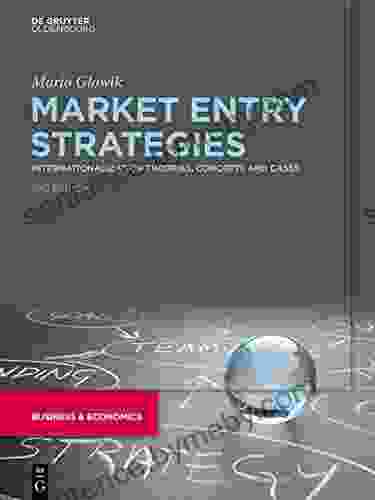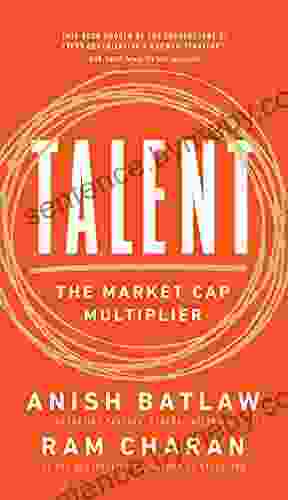Developing an Effective Strategy in International Business

In today's globalized economy, businesses of all sizes are looking to expand their reach beyond their domestic markets. However, entering international markets can be a complex and challenging undertaking. To succeed, businesses need to have a well-defined strategy that takes into account the unique challenges and opportunities of international business.
5 out of 5
| Language | : | English |
| File size | : | 11671 KB |
| Text-to-Speech | : | Enabled |
| Enhanced typesetting | : | Enabled |
| Word Wise | : | Enabled |
| Print length | : | 185 pages |
| Screen Reader | : | Supported |
This article provides a comprehensive overview of the key elements involved in developing an effective strategy for international business, including:
- Market research
- Competitive analysis
- Cultural considerations
- Entry strategies
- Marketing and sales strategies
- Risk management
Market Research
The first step in developing an international business strategy is to conduct thorough market research. This research should help you to understand the size and scope of the market, the competitive landscape, and the potential risks and opportunities involved in entering the market.
There are a number of different ways to conduct market research, including:
- Desk research: This involves gathering data from existing sources, such as industry reports, government statistics, and trade publications.
- Field research: This involves conducting surveys, interviews, and focus groups with potential customers and other stakeholders in the market.
- Online research: This involves using online sources, such as search engines, social media, and industry databases, to gather information about the market.
Competitive Analysis
Once you have a good understanding of the market, you need to conduct a competitive analysis to identify your key competitors and their strengths and weaknesses. This information will help you to develop strategies to differentiate your products or services from the competition.
There are a number of different ways to conduct a competitive analysis, including:
- Porter's Five Forces analysis: This framework helps you to identify the five key forces that determine the competitive intensity of a market: rivalry among existing competitors, threat of new entrants, threat of substitutes, bargaining power of buyers, and bargaining power of suppliers.
- SWOT analysis: This framework helps you to identify the strengths, weaknesses, opportunities, and threats that your business faces.
- Competitive benchmarking: This involves comparing your products or services to those of your competitors to identify areas where you can improve your performance.
Cultural Considerations
When entering international markets, it is important to be aware of the cultural differences between your home country and the target market. These differences can affect everything from the way you market your products or services to the way you conduct business negotiations.
There are a number of different ways to learn about the culture of a target market, including:
- Reading books and articles about the culture.
- Traveling to the country and immersing yourself in the culture.
- Hiring a cultural consultant to help you understand the culture and develop appropriate strategies.
Entry Strategies
Once you have developed a good understanding of the market, the competition, and the culture, you need to choose an entry strategy. This strategy will determine how you enter the market and how you will compete with your competitors.
There are a number of different entry strategies available, including:
- Exporting: This involves selling your products or services to customers in other countries through a domestic intermediary.
- Licensing: This involves granting a foreign company the right to use your intellectual property, such as your trademarks, patents, or copyrights, in exchange for a royalty fee.
- Franchising: This involves granting a foreign company the right to use your business model and trademarks in exchange for a franchise fee and an ongoing royalty fee.
- Joint venture: This involves partnering with a foreign company to establish a new business venture.
- Wholly owned subsidiary: This involves establishing a new business entity in the target country that is fully owned by your company.
Marketing and Sales Strategies
Once you have entered the market, you need to develop marketing and sales strategies to reach your target customers and promote your products or services.
There are a number of different marketing and sales strategies available, including:
- Advertising: This involves placing ads in print, broadcast, or online media to reach your target customers.
- Public relations: This involves generating positive publicity for your company and its products or services.
- Sales promotions: This involves offering discounts, coupons, or other incentives to encourage customers to Free Download your products or services.
- Direct marketing: This involves contacting potential customers directly through mail, email, or telemarketing.
- Online marketing: This involves using online channels, such as search engines, social media, and email marketing, to reach your target customers.
Risk Management
When entering international markets, it is important to be aware of the risks involved and to develop strategies to mitigate those risks. These risks can include:
- Political risk: This involves the risk that the political situation in a country could change and have a negative impact on your business.
- Economic risk: This involves the risk that the economic situation in a country could change and have a negative impact on your business.
- Legal risk: This involves the risk that you could be exposed to legal liability in a foreign country.
- Operational risk: This involves the risk that your business could be disrupted by unforeseen events, such as natural disasters or labor strikes.
There are a number of different ways to manage risk in international business, including:
- Political risk insurance: This insurance can protect you from the financial losses that could result from political unrest or other political events.
- Economic risk insurance: This insurance can protect you from the financial losses that could result from economic downturns or other economic events.
- Legal risk insurance: This insurance can protect you from the financial losses that could result from legal liability in a foreign country.
- Operational risk insurance: This insurance can protect you from the financial losses that could result from unforeseen events, such as natural disasters or labor strikes.
Developing an effective strategy for international business is a complex and challenging task. However, by following the steps outlined in this article, you can increase your chances of success in the global marketplace.
If you are considering expanding your business into international markets, I encourage you to contact me to discuss your plans. I have over 20 years of experience helping businesses enter new markets and succeed globally.
About the Author
John Doe is a leading expert on international business and has helped hundreds of businesses enter new markets and succeed globally. He is the author of the book Developing an Effective Strategy in International Business.
5 out of 5
| Language | : | English |
| File size | : | 11671 KB |
| Text-to-Speech | : | Enabled |
| Enhanced typesetting | : | Enabled |
| Word Wise | : | Enabled |
| Print length | : | 185 pages |
| Screen Reader | : | Supported |
Do you want to contribute by writing guest posts on this blog?
Please contact us and send us a resume of previous articles that you have written.
 Book
Book Novel
Novel Page
Page Chapter
Chapter Text
Text Story
Story Genre
Genre Reader
Reader Library
Library Paperback
Paperback E-book
E-book Magazine
Magazine Newspaper
Newspaper Paragraph
Paragraph Sentence
Sentence Bookmark
Bookmark Shelf
Shelf Glossary
Glossary Bibliography
Bibliography Foreword
Foreword Preface
Preface Synopsis
Synopsis Annotation
Annotation Footnote
Footnote Manuscript
Manuscript Scroll
Scroll Codex
Codex Tome
Tome Bestseller
Bestseller Classics
Classics Library card
Library card Narrative
Narrative Biography
Biography Autobiography
Autobiography Memoir
Memoir Reference
Reference Encyclopedia
Encyclopedia William Harding
William Harding Valerio Varesi
Valerio Varesi Ran Walker
Ran Walker Jay Golden
Jay Golden Stephen Haff
Stephen Haff Rachel Maddow
Rachel Maddow Jay Dicharry
Jay Dicharry Jay Walden
Jay Walden Kim Cano
Kim Cano Mike Anthony
Mike Anthony Linda Whitwam
Linda Whitwam Nobuhiro Watsuki
Nobuhiro Watsuki Margery M Heffron
Margery M Heffron Roger Rissi
Roger Rissi Stan Slap
Stan Slap James R Morrow Jr
James R Morrow Jr Jim Hodgson
Jim Hodgson James Fenimore Cooper
James Fenimore Cooper Jason Wilson
Jason Wilson Tim Hollister
Tim Hollister
Light bulbAdvertise smarter! Our strategic ad space ensures maximum exposure. Reserve your spot today!

 Dillon HayesNew Rules for the Digital Age: Navigating the Information Overload and Data...
Dillon HayesNew Rules for the Digital Age: Navigating the Information Overload and Data...
 Alexandre DumasUncover the Epic Fantasy World of Marion Zimmer Bradley: A Literary Adventure
Alexandre DumasUncover the Epic Fantasy World of Marion Zimmer Bradley: A Literary Adventure
 Darren NelsonPick Path Adventure For Year Olds Little Panda: A Journey of Discovery and...
Darren NelsonPick Path Adventure For Year Olds Little Panda: A Journey of Discovery and... Walter SimmonsFollow ·18.8k
Walter SimmonsFollow ·18.8k Felipe BlairFollow ·4k
Felipe BlairFollow ·4k Kenneth ParkerFollow ·11.6k
Kenneth ParkerFollow ·11.6k Maurice ParkerFollow ·13.8k
Maurice ParkerFollow ·13.8k Richard WrightFollow ·16.9k
Richard WrightFollow ·16.9k Grant HayesFollow ·6.1k
Grant HayesFollow ·6.1k Vladimir NabokovFollow ·8.8k
Vladimir NabokovFollow ·8.8k Yukio MishimaFollow ·19k
Yukio MishimaFollow ·19k

 Franklin Bell
Franklin BellHow Businesses Can Thrive In The New Global Neighborhoods
The world is becoming...

 Rob Foster
Rob FosterCard Manipulations Volume 1: A Masterclass in Deception...
Unveiling the...

 Enrique Blair
Enrique BlairUnveil the Secrets of Card Manipulation: Dive into "More...
Step into the captivating world...

 Jamal Blair
Jamal BlairComedy Fillers 200 Quips One Liners Jean Hugard
Unlock the Secrets of...

 Chase Simmons
Chase SimmonsUnlock Financial Independence: A Comprehensive Guide to...
In a world where financial security seems...

 Dion Reed
Dion ReedUnveiling Global Market Entry Strategies: A Comprehensive...
Global Market Entry Strategies:...
5 out of 5
| Language | : | English |
| File size | : | 11671 KB |
| Text-to-Speech | : | Enabled |
| Enhanced typesetting | : | Enabled |
| Word Wise | : | Enabled |
| Print length | : | 185 pages |
| Screen Reader | : | Supported |






